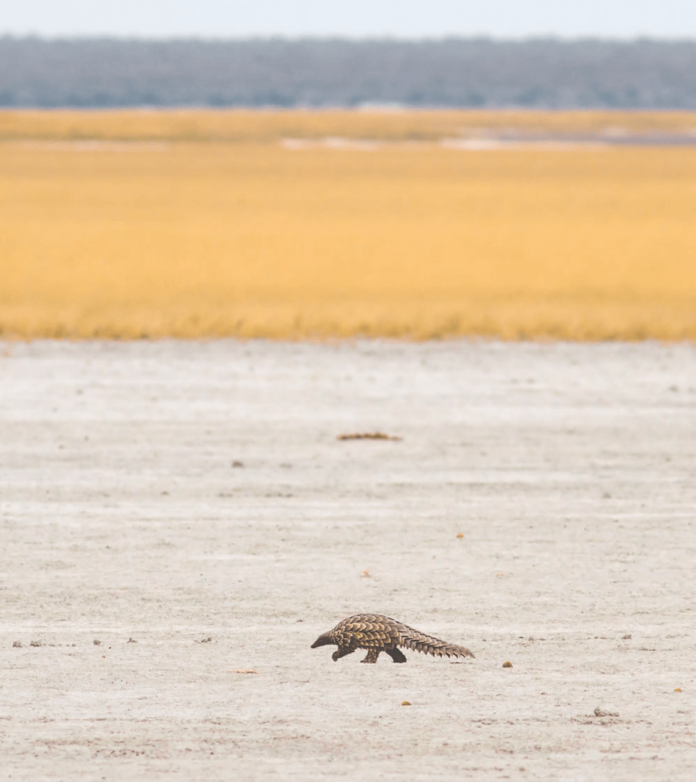Can the world’s most trafficked wild animal ever find protection?
Pangolins are among the least studied animals in the world, and little is known about the natural history or ecology of the world’s eight pangolin species. Even less is known about their role in a significant criminal economy where trafficked pangolins and the illegal sale of their scales and meat often go undetected. But one thing is known about the pangolin for a certainty: it’s the most trafficked wild animal in the world. And pangolin populations are rapidly declining due to the illegal hunting and trafficking.
A team of researchers and conservationists has launched Operation Pangolin, a bold initiative aimed at saving the elusive mammal. The project, which has core funding support from the Paul G. Allen Family Foundation, is currently being launched in Cameroon and Gabon, with plans to expand into Nigeria soon.

British actor and comedian Ricky Gervais, a vocal supporter of animal rights, has used his platform to raise awareness about the illegal wildlife trade. In 2018, he teamed up with the wildlife conservation organization WildAid to create a public service announcement about the illegal trade of pangolin scales.
Chinese actress and singer Li Bingbing, a goodwill ambassador for the United Nations Environment Programme (UNEP) since 2010, has also used her position to raise awareness about the illegal wildlife trade in China. She teamed up with WildAid in 2016 to create a video about the importance of protecting pangolins.
Leonardo DiCaprio has also used his platform to speak up for pangolins as has actress and singer Mandy Moore and singer-songwriter Sarah McLachlan.
But despite high visibility efforts like these, the illegal pangolin trade persists, driven by demand for their scales and meat in traditional Chinese medicine and as a luxury food item in China and other Asian countries. Pangolins are also used in traditional African medicine and as bushmeat in parts of Africa. The illegal trade in pangolins is estimated to be worth billions of dollars each year and has led to a sharp decline in pangolin populations. All eight species of pangolin are listed as either endangered or critically endangered by the International Union for Conservation of Nature (IUCN).
Without urgent conservation action at a global scale, all eight species of pangolins face extinction.
– Matthew H. Shirley, Florida International University
To combat the illegal wildlife trade, governments, and conservation organizations around the world are working to raise awareness about the issue and to strengthen laws and enforcement efforts.
Operation Pangolin says it will generate much-needed data to inform conservation strategies in Central Africa, with global implications for the illicit wildlife trade.
“Without urgent conservation action at a global scale, all eight species of pangolins face extinction,” Matthew H. Shirley from Florida International University and the project lead for Operation Pangolin, said in a statement. “Operation Pangolin is a chance to alter the conservation landscape for pangolins and other wildlife threatened by illicit human behavior.”
The data will come through the use of toolkits for pangolin monitoring and data collection, which will incorporate the latest advancements in hardware and software, while using locally accessible and low-cost technological components. The researchers will work with local conservation stakeholders, including Indigenous peoples, local communities, and government agencies to deploy monitoring programs, implement conservation interventions and develop predictive tools for addressing wildlife crime.

Bistra Dilkina, an associate professor of computer science and industrial and systems engineering at USC, will lead the data coalescence and artificial intelligence aspects of the project. “I look forward to drawing on my past decade of research in developing computer science solutions for biodiversity conservation to build new technology tools to address pangolin poaching and trafficking,” she said.
The project will also help implement the identified strategies, including wildlife crime prevention, with the hope of expanding their efforts into Asia, the only other continent with native pangolin populations. Both IUCN and the Parties to the Convention on International Trade in Endangered Species of Wild Fauna and Flora (CITES) agree that the development of pangolin-specific monitoring methods linked to anti-trafficking efforts is the highest conservation priority for these mammals.
Pangolin trafficking is a significant problem, with at least 250,000 pangolins estimated to be taken from African and Asian forests every year for consumers in China, Vietnam, and even western Europe and the United States. Enough pangolin scales have been seized in the past decade to account for at least one million pangolins, yet little is known of the trafficking supply chains. This number does not account for the pangolins that are removed undetected from the wild to fuel this illegal enterprise.

“Accurate, actionable data is the foundation of effective conservation efforts,” said Gabe Miller, director of technology on behalf of the Paul G. Allen Family Foundation. “Operation Pangolin will provide a blueprint for how conservationists can turn data into solutions that address important issues like wildlife trafficking and the biodiversity crisis head-on.”
The collaborative research team also includes Alasdair Davies from the Arribada Initiative, focusing on technological innovation; Dan Challender from the University of Oxford, focusing on trade and policy; and Meredith Gore from the University of Maryland, focusing on conservation criminology.
“In the last decade pangolin populations in Central Africa have been under increasing pressure from offtake for local use and international trafficking of their scales,” Challender said. “This project has the potential to transform pangolin conservation, first in key locations in Central Africa, and then extending into parts of Asia. By taking an interdisciplinary approach and using novel technology and artificial intelligence methods, the project will give pangolin populations in these regions the best chance of survival.”
The $4 million grant from the Paul G. Allen Family Foundation supports the current launch of the project in Central Africa. The research team is concurrently raising funds in an effort to expand the project to Asia by 2027.
Related on Ethos:


